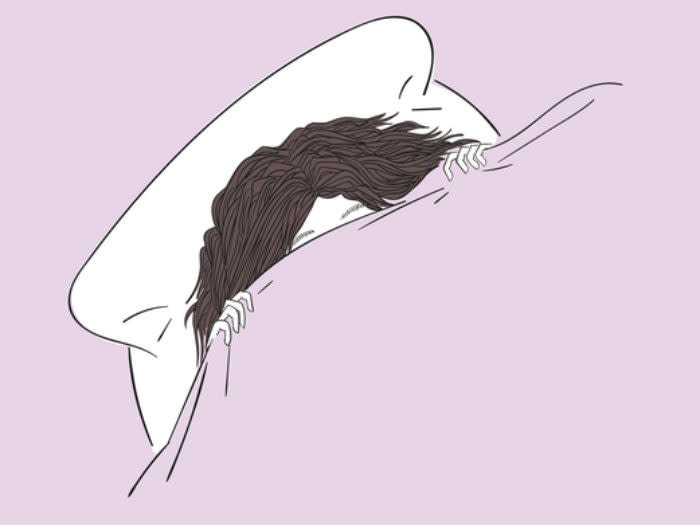How I’m surviving my 30s as a woman with Tourette Syndrome

I am sitting at a table of friends in one of those gastro bars where a Miller Lite costs eight dollars. The waiter is a young, enthusiastic Frenchman who is trying to talk us into ordering expensive wine, as if I have the sort of discerning palate that doesn’t drink Two Buck Chuck out of a pint glass while watching YouTube videos on my couch. My friends are discussing politics, and I am shoveling gourmet cheeses into my face as fast as my body will allow. (I ate a vegetable last week on purpose — I deserve this.)
I am polishing off a slab of brie when I feel it. That ominous sensation which has been coming with greater frequency these days. I quickly excuse myself and step outside. A cigarette should help. I light up with shaking hands and inhale deeply. A cabbie drives by picking his nose. I take another drag — and then it starts.
My head jerks sharply to the left; it jerks again. My hands curl up and fly forward, and my foot stomps on the ground.
Not again, I think. I’m out, not now. And then I feel it in my throat, the almost unstoppable urge to scream. You can do this, you can control this. You’re in public, you have to stop this now.
I finish the cigarette, contracting and releasing my muscles and breathing in the slow, steady way my doctor taught me. In through your mouth, out through your nose. I go inside.
I make a joke to my friends about cigarette addiction, because that’s somehow easier to explain. Under the table, my hands are clenching. My friends are talking about literature now, and I am boring holes into the back of the waiter’s head with my eyes. Bring the check. Bring it now. He slides the bill onto the table, but we all have to ask for separate checks. In through your mouth, out through your nose. I dig my fingernails into my palms.
I half-run to my car in the parking lot down the street. I collapse into the driver’s seat and a sound erupts from my lungs — guttural, like an animal.
My hand flies up into my shoulder, and then punches my thigh. My head jerks left, and left again, and my body is twitching uncontrollably and I am making noises like small gasps and yelps: Guh. Guh.
I take a deep breath. I light up a cigarette. My neck hurts. I drive home.
This episode, which has become typical for me in recent years, occurred because the neurotransmitters in my brain connect about as well as Ayn Rand and Bernie Sanders on a first date. This is signified by a constant inability to get comfortable — shifting, fidgeting, twitching, moving. This is making sounds like you were just punched in the gut while you’re only trying to order a pizza.
This is having no control over the things your body does.
This is Tourette Syndrome.
Most people only know Tourette Syndrome from viral YouTube videos or Rob Schneider movies. Most people think that Tourette’s means you scream obscenities at random strangers and call the nice lady at the supermarket a fat old hag — that’s called coprolalia, which affects about ten percent of the Tourette’s population. One percent of people have tic disorders — which is so rare that, while typing this essay, my computer didn’t recognize the word “tic.” (I had to add it to my dictionary several times before Google Docs would acknowledge my existence.) Most cases of tic disorders arise in childhood and abate throughout adolescence. Only an estimated five to fourteen percent of people with Tourette’s have tics that worsen in adulthood.
I am one of those lucky people.
I experience two types of tics: those that are involuntary and those that are preceded by what is called a premonitory urge — an intrinsic need to move, like an itch you absolutely must scratch.
You have to scratch it. You have to. Now. Do it now. You have to do it now.
And then it’s in your fingers and ankles and neck and wrists and it’s four o’clock in the morning and you have to be up at 7 a.m. Or you’re on a first date with a promising young man and your facial tic is making him think that you’re annoyed with everything he’s saying. A guy I dated told me this a few months after meeting me:
“You kept grimacing when I was talking and I thought I was pissing you off. But then we made out.”
Confusing men into kissing me is one of my best moves.
For me, the tics started when I was young, and steadily worsened as I got older.
It began with a tic in my little finger, which my doctor futilely attempted to resolve by immobilizing it in a plastic brace. As I got older, the tics spread throughout the rest of my body, first in my fingers, then my neck and wrists, then everywhere else. My body is always moving. My joints are always moving — I move more joints than a drug dealer at Bonnaroo.
Some days, my tics really aren’t that bad. I can go weeks without episodes like the one I had at the restaurant, and most of the time, I just fidget a lot — which people love to call attention to. “You’re so fidgety. Can’t you sit still?”
Other days, it’s like lying in bed on a hot summer night in an apartment with no air conditioning, and you keep tossing and turning, trying to unstick one leg from the other, and the sheet feels like it’s made out of sandpaper, and no matter how you reposition yourself, you can’t get comfortable.
One of the hardest things about Tourette Syndrome is how visible it is. I have to excuse myself in social situations often, or everyone at Jamba Juice will be wondering why the tired-looking twitchy girl keeps punching herself in the chest. The vocal tics in particular are impossible to hide, which is why I have considered fronting a metal band that only performs last minute shows, running anywhere from five minutes to three hours. We would be called Tic Cheney or The Twitching Hour.
Treatment for my Tourette’s has been difficult.
I have tried almost every medication on the market, each with their own potential side effects, encompassing everything from depression, mania, weight gain, and insomnia, to suicidal ideation, fatal arrhythmias, and permanent blindness — all this to lessen the tics but not entirely eradicate them. Nicotine has been clinically proven to help abate tics, but as a chain-smoker with the lungs of a 90-year-old asthmatic coal miner, I can’t say I’d recommend it. Thankfully, Tourette’s is actually one the few disorders that qualifies for medical marijuana prescriptions in my state, so I’ll take cannabis pills.
There is a homeless man in my neighborhood who I suspect has Tourette’s. He wanders the streets, screaming and grunting, and everyone is afraid of him. I was too, at first. But one morning, I saw him sitting on the hood of my car. He was rocking back and forth, arms curled up into his chest, shrieking into the sky. As I got closer, he turned sharply toward me, his eyes wild with fear. He whimpered and backed away, and then ran yelping down the street. But that look he gave me — exhausted, terrified, haunted. I will never forget that look. I’ve felt what was in those eyes. The fear of judgment. The loss of yourself. The loss of control.
So much of life is spent trying to maintain control of the things around us — our jobs, our relationships, debt, fear, worried thoughts that crawl into our brains during idle moments.
The deterioration of my condition — constant dull pain in my joints and the inevitable toll it will take on my body — has been my most significant loss of control.
I’ve had to begrudgingly adjust to the resignation that this will be the rest of my life.
So I focus on the things I can control.
I fight the battles that I can win, because it all comes down to choice. I can cling to the idea of what could be, or I can accept the reality of what is, and do everything in my power to improve it. I can stay positive when things are hard. That is my control.
Tourette’s is not an easy thing to live with, but it’s part of who I am.
If I could change it, if a genie showed up and offered me the chance to live without Tourette’s, I’d say, “Absolutely, get that shit out of here. And take these spider veins with you while you’re at it.” But it’s not going away anytime soon — so I have accepted it as a unique facet of myself. Maybe, someday, they will find a cure. Maybe, someday, I will live a life free of fidgets and tics and zombie-warthog noises. That is my hope.
But for now, I’ll just keep keeping twitching on.





